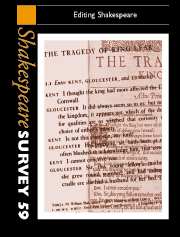Book contents
- Frontmatter
- Editing Shakespeare’s Plays in the Twentieth Century
- Crisis in Editing?
- On Being a General Editor
- Altering the Letter of Twelfth Night: ‘Some are born great’ and the Missing Signature
- ‘A Thousand Shylocks’: Orson Welles and The Merchant of Venice
- The Date and Authorship of Hand D’s Contribution to Sir Thomas More: Evidence from ‘Literature Online’
- Ferdinand’s Wife and Prospero’s Wise
- Editing Stefano’s Book
- Manuscript, Print and the Authentic Shakespeare: The Ireland Forgeries Again
- The Author, the Editor and the Translator: William Shakespeare, Alexander Chalmers and Sándor Petofi or the Nature of a Romantic Edition
- Women Edit Shakespeare
- The Shakespeare Edition in Industrial Capitalism
- Print and Electronic Editions Inspired by the New Variorum Hamlet Project
- The Evolution of Online Editing: Where Will it End?
- The Director as Shakespeare Editor
- The Editor as Translator
- Performance Editions, Editing and Editors
- Editing Collaborative Drama
- Will in the Universe: Shakespeare’s Sonnets, Plato’s Symposium, Alchemy and Renaissance Neoplatonism
- Giants and Enemies of God: The Relationship between Caliban and Prospero from the Perspective of Insular Literary Tradition
- Shakespeare’s Ages
- Who Wrote William Basse’s ‘Elegy on Shakespeare’?: Rediscovering a Poem Lost from the Donne Canon
- ‘Sometime a Paradox’: Shakespeare, Diderot and the Problem of Character
- Shakespeare Performances in England, 2005
- Professional Shakespeare Productions in the British Isles, January–December 2004
- The Year's Contributions to Shakespearian Study 1 Critical Studies
- 2 Shakespeare in Performance
- 3 Editions and Textual Studies
- Index
The Evolution of Online Editing: Where Will it End?
Published online by Cambridge University Press: 28 March 2007
- Frontmatter
- Editing Shakespeare’s Plays in the Twentieth Century
- Crisis in Editing?
- On Being a General Editor
- Altering the Letter of Twelfth Night: ‘Some are born great’ and the Missing Signature
- ‘A Thousand Shylocks’: Orson Welles and The Merchant of Venice
- The Date and Authorship of Hand D’s Contribution to Sir Thomas More: Evidence from ‘Literature Online’
- Ferdinand’s Wife and Prospero’s Wise
- Editing Stefano’s Book
- Manuscript, Print and the Authentic Shakespeare: The Ireland Forgeries Again
- The Author, the Editor and the Translator: William Shakespeare, Alexander Chalmers and Sándor Petofi or the Nature of a Romantic Edition
- Women Edit Shakespeare
- The Shakespeare Edition in Industrial Capitalism
- Print and Electronic Editions Inspired by the New Variorum Hamlet Project
- The Evolution of Online Editing: Where Will it End?
- The Director as Shakespeare Editor
- The Editor as Translator
- Performance Editions, Editing and Editors
- Editing Collaborative Drama
- Will in the Universe: Shakespeare’s Sonnets, Plato’s Symposium, Alchemy and Renaissance Neoplatonism
- Giants and Enemies of God: The Relationship between Caliban and Prospero from the Perspective of Insular Literary Tradition
- Shakespeare’s Ages
- Who Wrote William Basse’s ‘Elegy on Shakespeare’?: Rediscovering a Poem Lost from the Donne Canon
- ‘Sometime a Paradox’: Shakespeare, Diderot and the Problem of Character
- Shakespeare Performances in England, 2005
- Professional Shakespeare Productions in the British Isles, January–December 2004
- The Year's Contributions to Shakespearian Study 1 Critical Studies
- 2 Shakespeare in Performance
- 3 Editions and Textual Studies
- Index
Summary
In his keynote address on the Future of Shakespeare at the inaugural British Shakespeare Association conference in Leicester in September 2003, Jonathan Bate argued that future scholarly editions of Shakespeare would be online, because only the digital environment can show the depth and complexity of the scholarly project. This acknowledgement of the influence of the online environment follows a period of resistance to and upheaval in the development of the digital dissemination of Shakespeare’s work. What this statement acknowledges is the emergence of a series of what have been termed second-generation projects in digital editing, projects that have learned from the mistakes of the past. The question remains, however, of what form the online edition in this new stage of development will take. This essay attempts to bring that question, which has been debated for too long among only a small group of specialists, to a wider audience.
The history of digital editing is relatively short but filled with activity and drama. Given that many of the early digital projects were created on cd and are only available in the collections of those who purchased them at the time, it is important, at this crucial juncture, to document work that might otherwise disappear without a trace. The development of the online edition owes a great deal to these early experiments in that they mapped out the difficult and complex terrain of the digital world. The contested questions of copyright, intellectual property and ownership of the final edited texts has meant that even in the open environment of the Internet there remain only a handful of serious attempts to address the issue of what a scholarly online edition of the plays should look like and how it should function. In this essay, I will outline the nature of the crossroads we currently face by placing it into its historical context.
- Type
- Chapter
- Information
- Shakespeare Survey , pp. 168 - 181Publisher: Cambridge University PressPrint publication year: 2006
- 2
- Cited by

